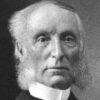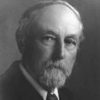But we are so blind to our own shortcomings, so wide awake to those of others. Everything that happens to us is always the other person’s fault. Angelina would have gone on loving Edwin forever and ever and ever if only Edwin had not grown so strange and different. Edwin would have adored Angelina through eternity if Angelina had only remained the same as when he first adored her.
It is a cheerless hour for you both when the lamp of love has gone out and the fire of affection is not yet lit, and you have to grope about in the cold, raw dawn of life to kindle it. God grant it catches light before the day is too far spent. Many sit shivering by the dead coals till night come.Jerome K. Jerome (1859-1927) English writer, humorist [Jerome Klapka Jerome]
Idle Thoughts of an Idle Fellow, “On Being in Love” (1886)
(Source)
Quotations about:
faults
Note not all quotations have been tagged, so Search may find additional quotes on this topic.
A neurotic is someone who’s afraid to see himself as he’s afraid others see him.
Mignon McLaughlin (1913-1983) American journalist and author
The Second Neurotic’s Notebook, ch. 10 (1966)
(Source)
Even if there were only two men left in the world and both of them saints they wouldn’t be happy. One of them would be bound to try and improve the other. That is the nature of things.
Frank O'Connor (1903-1966) Irish author and translator [pseud. of Michael O'Donovan]
“Song Without Words” (1951)
(Source)
Opening words. First printed in Argosy (1951-12).
Two persons will not be friends long if they are not inclined to pardon each otherʼs little failings.
[L’on ne peut aller loin dans l’amitié, si l’on n’est pas disposé à se pardonner les uns aux autres les petits défauts.]
Jean de La Bruyère (1645-1696) French essayist, moralist
The Characters [Les Caractères], ch. 5 “Of Society and Conversation [De la Société et de la Conversation],” § 62 (5.62) (1688) [tr. Van Laun (1885)]
(Source)
(Source (French)). Alternate translations:
Two persons will not be friends a long time, if they can't forgive each other little failings.
[Bullord ed. (1696)]
Two Persons will not be long Friends, if they can't forgive each other little Failings.
[Curll ed. (1713)]
You will never go far in friendship unless you are ready to forgive each other's petty faults.
[tr. Stewart (1970)]
The cardinal method with faults is to overgrow them and choke them out with virtues.
Many owe their greatness to their enemies. Flattery is fiercer than hatred, for hatred corrects the faults flattery had disguised. The prudent man makes a mirror out of the evil eye of others; it is more truthful than that of affection, and helps him reduce his defects or emend them.
[Fabricáronles a muchos su grandeza sus malévolos. Más fiera es la lisonja que el odio, pues remedia este eficazmente las tachas que aquella disimula. Hace el cuerdo espejo de la ojeriza, más fiel que el de la afición, y previene a la detracción los defectos, o los enmienda.]
Baltasar Gracián y Morales (1601-1658) Spanish Jesuit priest, writer, philosopher
The Art of Worldly Wisdom [Oráculo Manual y Arte de Prudencia], § 84 (1647) [tr. Maurer (1992)]
(Source)
(Source (Spanish)). Alternate translations:
Many owe their fortune to their enviers. Flattery is more cruel than ha∣tred, in as much as it palliates the faults, which the other makes us remedy. The wise man makes the hatred of his Enviers his looking-glass, wherein he sees himself far better than in that of kindness.
[Flesher ed. (1685)]
Many have had their greatness made for them by their enemies. Flattery is more dangerous than hatred, because it covers the stains which the other causes to be wiped out. The wise will turn ill-will into a mirror more faithful than that of kindness, and remove or improve the faults referred to.
[tr. Jacobs (1892)]
Many have been made through the greatness of their enemies. Far more to be feared is flattery, than hate, since this exposes the flaws, which flattery would conceal. The man who knows makes a mirror of spite, more faithful than the mirror of affection, and envisages his shortcomings, to correct them.
[tr. Fischer (1937)]
It is an error to suppose that no man understands his own character. Most persons know even their failings very well, only they persist in giving them names different from those usually assigned by the rest of the world; and they compensate for this mistake by naming, at first sight, with singular accuracy, those very same failings in others.
Arthur Helps (1813-1875) English writer and bureaucrat
Thoughts in the Cloister and the Crowd (1835)
(Source)
It is better to correct your own faults than those of another.
[Κρέσσον τὰ οἰκήϊα ἐλέγχειν ἁμαρτήματα ἢ τὰ ὀθνεῖα.]
Democritus (c. 460 BC - c. 370 BC) Greek philosopher
Frag. 60 (Diels) [tr. Bakewell (1907)]
(Source)
Original Greek. Diels cites this as "Fragment 60, (114 N.) DEMOKRATES. 25"; collected in Joannes Stobaeus (Stobaios) Anthologium III, 13, 46. Bakewell lists this under "The Golden Sayings of Democritus." Freeman notes this as one of the Gnômae, from a collection called "Maxims of Democratês," but because Stobaeus quotes many of these as "Maxims of Democritus," they are generally attributed to the latter.
Alternate translations:
- "It is better to examine one's own faults than those of others." [tr. Freeman (1948)]
- "It is better to examine your own mistakes than those of others." [tr. Barnes (1987)]
- "It is better to rebuke familiar faults than foreign ones." [tr. @sententiq (2018)]
- "Rather examine your own faults than those of others." [Source]
Trust no friend without faults,
And love a maiden, but no angel.[Trau keinem Freunde sonder Mängel,
Und leib’ ein Mädchen, kienem Engel.]
Self-love is often rather arrogant than blind; it does not hide our faults from ourselves, but persuades us that they escape the notice of others, and disposes us to resent censures lest we should confess them to be just.
Samuel Johnson (1709-1784) English writer, lexicographer, critic
The Rambler, #155 (10 Sep 1751)
(Source)
In repenting ov sins, men are apt tew repent ov thoze they hain’t got, and overlook those they hav.
[In repenting of sins, men are apt to repent of those they haven’t got, and overlook those they have.]
Josh Billings (1818-1885) American humorist, aphorist [pseud. of Henry Wheeler Shaw]
Everybody’s Friend, Or; Josh Billing’s Encyclopedia and Proverbial Philosophy of Wit and Humor, ch. 155 “Affurisms: Ink Lings” (1874)
(Source)
It is in our faults and failings, not in our virtues, that we touch one another and find sympathy. We differ widely enough in our nobler qualities. It is in our follies that we are at one.
Jerome K. Jerome (1859-1927) English writer, humorist [Jerome Klapka Jerome]
Idle Thoughts of an Idle Fellow, “On Vanity and Vanities” (1886)
(Source)
The faults of others console us in our own.
Paul Eldridge (1888-1982) American educator, novelist, poet
Maxims for a Modern Man, #2178 (1965)
(Source)
Strive to be patient; bear with the faults and frailties of others, for you, too, have many faults which others have to bear. If you cannot mould yourself as you would wish, how can you expect other people to be entirely to your liking?
[Stude patiens esse in tolerando aliorum defectus, et qualescumque infirmitates, quia et tu multa habes, quæ ab aliis oportet tolerari. Si non potes te talem facere qualem vis, quomodo poteris alium habere ad beneplacitum tuum?]
Thomas à Kempis (c. 1380-1471) German-Dutch priest, author
The Imitation of Christ [De Imitatione Christi], Book 1, ch. 16, v. 2 (1.16.2) (c. 1418-27) [tr. Sherley-Price (1952)]
(Source)
(Source (Latin)). Alternate translations:
Study always that thou mayest be patient in suffering of other men’s defaults, for thou hast many things in thee that others do suffer of thee: and if thou canst not make thyself to be as thou wouldst, how mayest thou then look to have another to be ordered in all things after thy will?
[tr. Whitford/Raynal (1530/1871)]
Study always to be patient in bearing other men's defects, for you have many in yourself that others suffer from you, and if you cannot make yourself be as you would, how may you then look to have another regulated in all things to suit your will?
[tr. Whitford/Gardiner (1530/1955)]
Endeavour thy selfe patiently to bear with any faults and infirmities of others, for that thou thy selfe hast many things that must be borne withall by others. If thou canst not make thy selfe such a one as thou wouldst be, how canst thou expect to have another to thy liking in all things?
[tr. Page (1639), 1.16.6-7]
Remember, that You also have many Failings of your own, by which the Patience of other People will have its turn of being exercised. And if you do (as certainly you cannot but) see this, think how unreasonable it is, to expect you should make others in all particulars, what you would have them to be; when you cannot so much as make your self, what you are sensible you ought to be.
[tr. Stanhope (1696; 1706 ed.)]
Endeavor, to be always patient of the faults and imperfections of others; for thou haft many faults and imperfections of thy own, that require a reciprocation of forbearance. If thou art not able to make thyself that which thou wishest to be, how canst thou expect to mould another in conformity to thy will?
[tr. Payne (1803), 1.16.3]
Endeavour to be patient in bearing with the defects and infirmities of others, of what sort soever they be; for that thyself also hast many [failings] which must be borne with by others. If thou canst not make thyself such an one as thou wouldest, how canst thou expect to have another in all things to thy liking?
[ed. Parker (1841)]
Endeavour to be always patient of the faults and imperfections of others, whatever they may be; for thou hast many faults and imperfection of thy own, that require forbearance from others. If thou art not able to make thyself that which thou wishest to be, how canst thou expect to mould another in conformity to thy will?
[tr. Dibdin (1851)]
Endeavour to be patient in bearing with defects and infirmities in others, of what kind soever; because thou also hast many things which others must bear with. If thou canst not make thyself such as thou wouldst, how canst thou expect to have another according to thy liking?
[ed. Bagster (1860)]
Endeavour to be patient in bearing with other men’s faults and infirmities whatsoever they be, for thou thyself also hast many things which have need to be borne with by others. If thou canst not make thine own self what thou desireth, how shalt thou be able to fashion another to thine own liking.
[tr. Benham (1874)]
Endeavour to be patient in bearing with the defects and infirmities of others, of what sort soever they be; for that thyself also hast many failings which must be borne with by others. If thou canst not make thyself such an one as thou wouldst, how canst thou expect to have another in all things to thy liking?
[tr. Anon. (1901)]
Try to bear patiently with the defects and infirmities of others, whatever they may be, because you also have many a fault which others must endure. If you cannot make yourself what you would wish to be, how can you bend others to your will?
[tr. Croft/Bolton (1940)]
Try to be patient in bearing with others’ failings and all kinds of weaknesses, for you too have many which must be put up with by others. If you cannot mould yourself exactly as you would, how can you get another to be satisfying to you?
[tr. Daplyn (1952)]
Yes, you do well to cultivate patience in putting up with the shortcomings, the various disabilities of other people; only think how much they have to put up with in you! When you make such a failure of organizing your own life, how can you expect everybody else to come up to your own standards?
[tr. Knox-Oakley (1959)]
Try to be patient in bearing with the failings and weaknesses of other people, whatever they may be. You too have many faults, which others have to endure. If you cannot make yourself the kind of person you wish, how can you expect to have someone else to your liking?
[tr. Knott (1962)]
Seek always to be tolerant of the shortcomings and failings of others. They also have much to tolerate in you. If you are unable to mould yourself as you wish, how can you expect others to conform to your liking?
[tr. Rooney (1979)]
Take pains to be patient in bearing all the faults and weaknesses of others, for you too have many flaws that others must put up with. If you cannot make yourself as you would like to be, how can you expect to have another person entirely to your liking?
[tr. Creasy (1989)]
For it is the characteristic of folly, to have eyes for the faults of others, and blindness for its own.
[Est enim proprium stultitiae aliorum vitia cernere, oblivisci suorum.]
Marcus Tullius Cicero (106-43 BC) Roman orator, statesman, philosopher
Tusculan Disputations [Tusculanae Disputationes], Book 3, ch. 30 (3.30) / sec. 73 (45 BC) [tr. Otis (1839)]
(Source)
(Source (Latin)). Alternate translations:
For it is the property of Folly, to look upon other mens Failings, and to forget their own.
[tr. Wase (1643)]
For it is the peculiar characteristic of folly to discover the vices of others, forgetting its own.
[tr. Main (1824)]
For it is the peculiar characteristic of folly to perceive the vices of others, but to forget its own.
[tr. Yonge (1853)]
It is the peculiar quality of a fool to perceive the faults of others and to forget his own.
[Source (1882)]
It is the property of folly to see the faults of others, to forget its own.
[tr. Peabody (1886)]
This is just how foolish people behave: they observe the faults of others and forget their own.
[tr. Graver (2002)]
It is a trait of fools to perceive the faults of others but not their own.
God’s merits are so transcendent that it is not surprising his faults should be in reasonable proportion.
Samuel Butler (1835-1902) English novelist, satirist, scholar
The Note-Books of Samuel Butler, “Rebelliousness”(1912)
Full text.

















